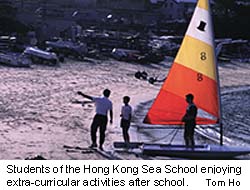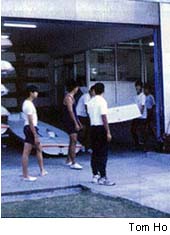December 1998
Alternative Schools:Practical secondary schoolsBy Tom Ho
Ironically, more people knew about practical schools in Hong Kong until a student was reported beating his principal. Mr. Lucas Chan, the principal of The Hong Kong Sea School said, "Two-thirds of our students are referred by the Special Education Unit of the Education Department. "Our school offers a chance for them to acquire basic education," said Mr. Chan.
These practical schools focus on maintaining discipline and developing self-esteem rather than achieving academic excellence, as grammar schools usually do. "Our curriculum includes both general subjects, like Chinese and mathematics, and practical subjects, like seamanship, office practice, photography and cooking. "Ethics, sex, and civil education are promoted through seminars and public services. We encourage the students to take part in selling flags and visiting the elderly,"said Mr. Chan. "Emphasis on students' participationin extracurricular activities and public services gives them greater confidence," said Mr. So Kin-kwan, principal of the Tung Wah Group of Hospitals C.Y. MA Charity Fund Practical School. "Hostels are essential in managing the conduct of our students. Hostel life can help them know how to live with others and become more independent. Inter-house competitions can help build their sense of belonging," he continued. One special thing about practical school is its hostel life. "Hostels provide grounds for managing the conduct of our students. Hostel life is a precious experience as they learn how to live with others. Also, they are trained to be more independent. "In practical schools, classroom management includes not only imparting knowledge but also providing professional counselling service to students,"said Mr. Cheung Kit-Keung, the chairman of the Counselling Unit and the guardian teacher of The Hong Kong Sea School. "Some students are more emotional as they come from broken families or are affected by their peers," said Mr. Cheung. "About 80 percent of them are unwilling to go to school and are relatively more rebellious. "Whenever they misbehave, we listen to them patiently. Time and care do work," said Mr. Cheung. Mr. Cheung said that since it is not easy for them to handle the heavy workload, they need more teachers, social workers and wardens. "The Education Department is definitely responsible for giving more resources to practical schools," said Miss Tsang Yuen-Yi, a social worker of The Hong Kong Sea School who has worked there for four years. "The educational psychologists visit only once every three weeks to give advice to the very tough cases. Moreover, we occasionally have to deal with drug and triad problems. "Some students are highly reluctant to contact me. They would just stare at me and walk away," said Miss Tsang. "In dealing with the student dropout, we are in a passive role. We can only inform the Education Department and wait for its reply," said Mr. So Kin-Kwan. Nonetheless, "We will not lose our faith and we are looking
for students' improvement instead of outstanding academic result,"said Mr. So, "We aim at
helping them to become good citizens and contribute to our society."
Indeed, the increasing attendance rate and the dropping late rate show that students’ attitude are improving gradually. "Over 70 percent of our form three students further their studies in either grammar schools or technical institutes," said Mr. So. However, when these students change to grammar schools or technical institutes, the drop-out rate is relatively high because they find it difficult to study there. Grammar schools are inexperienced in helping these students and they pay little attention to them. "I hope the public will not discriminate against practical schools students. I hope they will be given opportunities to participate in our community," said Mr. So.
|

